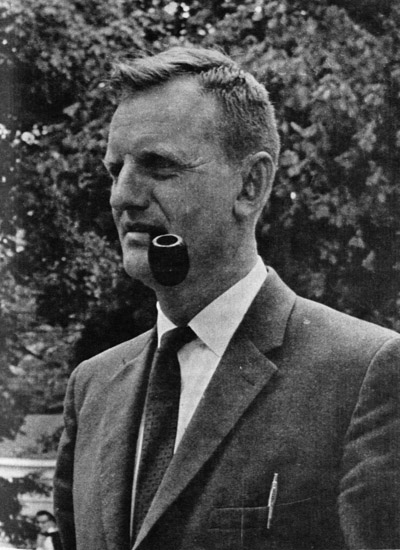Editor of this issue: Thomas Remeikis
Copyright © 1964 LITUANUS Foundation, Inc.

|
LITUANUS
LITHUANIAN
QUARTERLY JOURNAL OF ARTS AND SCIENCES
Volume 10, No.2 - Summer 1964
Editor of this issue: Thomas Remeikis ISSN 0024-5089
Copyright © 1964 LITUANUS Foundation, Inc. |

|
 |
JULIUS KAUPAS
1920 - 1964
Julius Kaupas, a writer, critic, publicist, psychiatrist by profession, was an accomplished author oj the younger generation of Lithuanian writers. Early death deprived Lithuanian literature of a significant contributor. Among the numerous critical esseys, short stories, tales, and psychological articles that Kaupas produced, the best known work is a collection of tales and phantastic stories — Daktaras Kripštukas Pragare (Doctor Scribble in Hell),published in 1948.
Julius Kaupas was influenced by such writers as E.T.A. Hoffmann, Dickens, and M. de Unamuno, and is the only writer of his generation whose aesthetics and form are derived from the classical European cultural tradition. His prose, from the standpoint of style and content, has almost nothing in common with modern literary movements or even with the ethnographic school of Lithuanian literature. Most characteristic features of Kaupas' style and form are clarity, symmetry, and balance. Moral problems are the subjects of his best tales (such as "The Story of Harlequin's Love"): the mistique of Good and Evil and the sublimation of the struggle against Evil. There is no human medium among his personages: they are representatives of universal Goodness and universal Evil.
Kaupas' conception of reality is idealistic: there is no boundary between fantasy and reality. Reality is fantasy and vice versa. The devil, a symbol of evil, exists in reality as well as in fantasy.
Kaupas' short stories differ from his tales in that psychology replaces fantasy in the short story. Most characteristic personages of his short stories are melancholic idealists. Even in criticism, as in tales, Kaupas in a sense could be called an idealist, relating beauty to the concepts of goodness and ideals.